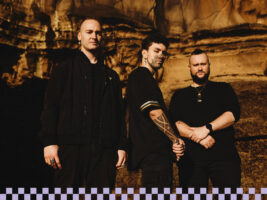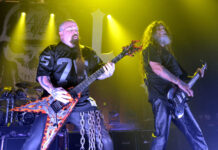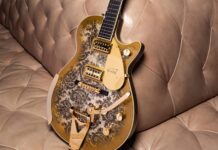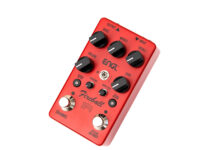
Meet Alien Weaponry: the Gojira-endorsed metal band championing indigenous rights and filling arenas
Alien Weaponry are very tired. When I video-call singer/guitarist Lewis de Jong and bassist Tūranga Morgan-Edmonds, the New Zealanders have just returned to Aotearoa after a whirlwind two months of touring: they supported Slayer guitarist Kerry King’s solo band all over North America, then almost immediately dove into a headline run across their home country. Now they’re in the middle of a series of interviews to promote their new album, Te Rā.
READ MORE: How Bloodywood became South Asia’s world-beating metal sensation
“We’ve done eight weeks of touring in 2025 alone, and that’s more than we’ve done in a single year over the past three, four years,” summarises Morgan-Edmonds, with he and his bandmate’s exhaustion palpable. Where the bassist joins our call with his camera off, de Jong routinely mutes himself to let out a string of coughs.
However, this is what you endure when the trade-off is getting to play in one of heavy metal’s biggest buzz bands. Co-founded by de Jong and his drummer brother Henry when the pair were eight and 10 respectively, Alien Weaponry have wowed audiences and fellow artists alike with their Māori-language groove metal. Now aged between 22 and 25, they’ve unloaded three albums of conscious anthems, raging against imperialism while sharing stories and customs from their native culture.
After their music went viral in the mid-to-late 2010s, the three-piece opened the main stage at Download festival in 2019: a booking that’s also affirmed the “rising star” status of Trivium, Bloodywood and others. “That was indescribable to say the least,” a shaky-voiced Lewis remembers. “I was only 17, and I’m pretty sure I had, like, half an hour of sleep that night, which only made the whole experience 10 times more fun.”
Then, after Covid, the band supported Grammy-winning enviro-metal crusaders Gojira in arenas on two continents. “Those tours were an absolutely huge deal for us,” Lewis continues. “Gojira were a band that me and my brother were already fans of, years and years and years before that. Just seeing the scale and the workflow of those whole tours was really eye-opening. Also, getting to have human-to-human conversations with some people that we really look up to, I’m eternally grateful that I got to experience that.”
Living Language
With their ascent, Alien Weaponry have offered thousands of metalheads an introduction to Māori life and history. The indigenous Polynesians’ population is roughly one million in Aotearoa, but since the country’s colonisation, their ways have been threatened by forced assimilation into Western customs. Only 200,000 Kiwis can speak te reo, the Māori language, at a conversational level.
Lewis and Henry are Dutch-Māori, while Morgan-Edmonds (who joined the band in 2020) is Scottish-Māori. The brothers’ first language was te reo and they attended kura kaupapa – Māori-language immersion school – before being forced to switch to English-language education. “When we did that, basically 98 percent of the vocabulary just left my brain,” Lewis remembers.
The frontman adds that having white skin made the siblings feel like outsiders in their own culture, an experience shared by Morgan-Edmonds. However, the band’s songs still relay their people’s myths and document the atrocities they’ve suffered. 2019 single Ahi Kā, for instance, is about Auckland City Council evicting the local Ngāti Whātua people from their village and then burning it down, in an attempt to ‘beautify’ the area for a royal visit. Meanwhile, 2021’s Hatupatu takes its name from a rangatira (tribal chief) who according to legend hid inside of a rock to escape the monster Kurangaituku.
I ask why the band find it so vital to narrate Māori stories when, in their own words, they felt “othered” from their own people growing up. “Sometimes you just don’t choose, you know?” answers Morgan-Edmonds. “All of us, we have Māori parents and, in New Zealand, we live in the country of our own people. It just becomes a part of you, because that’s the nature of cultural upbringing.”
Myth and Legend
Alien Weaponry’s embodiment of so much of Māori culture – its language, its myths, its history – has led to many headlines and observers boiling the band down to ‘Māori metal’. However, as Morgan-Edmonds points out, their music is not just for their own culture, and they’ve noticed crowds around the world identifying with their lyrics.
“We played in Albuquerque, New Mexico [during the tour with Kerry King this year],” the bassist reflects, “and a huge chunk of the audience that came out was from the Navajo Nation, a Native American nation over there in the US. They attach themselves to our music because it’s a similar thing: indigenous pride, also reflecting on indigenous struggles and colonialism. So, when you have something that says ‘Māori metal’, I do think it’s important for the audience. Representation does a lot more than what a lot of people think it does.”
It’s not all been dream bookings, though. In 2022, Alien Weaponry played what should have been a pinch-me slot opening for Guns N’ Roses at the 50,000-capacity Eden Park in Auckland. During an interview shortly afterwards, Lewis grumbled about the lack of attendees singing in te reo, given he’d previously seen audiences do so in countries as far-flung as Spain.
“I guess that’s probably just Guns N’ Roses’ demographic,” he says more diplomatically today. “I actually noticed on this last New Zealand tour, there were a lot of people singing all the lyrics, a lot of younger people in the crowd, a lot of Māori in the crowd. It was really interesting and cool to see.”
On recent albums – Te Rā and its 2021 predecessor, Tangaroa – Alien Weaponry don’t just discuss Māori topics; they also talk about broader issues from a Māori perspective. For example, Tangaroa’s title track laments climate change, marine litter and overfishing by personifying the sea as Tangaroa, the Māori god of the ocean. On the new album, Mau Moko doesn’t explain the custom of Māori tattooing (tā moko) as much as it lambasts those who fetishise such practices. “You displayed our skin as spectacle! We have taken back our tradition!” Lewis roars in te reo.
Morgan-Edmonds, who wrote the song’s lyrics, got moko kanohi – a facial tattoo – at the tail end of 2021. “I walk around with this thing that undoubtedly marks me as Māori,” he says. “I’m experiencing this very strange thing now, where the acceptance from Māori has been astronomical. I’ve been acknowledged by Māori – out in public, by strangers, by my own family – 10 times over what I ever experienced growing up. On the other end of it, you get so much more hostility from those who are anti-that. I’m representing Maori, and I’m still representing Scottish and British, so I’m always representing all my heritage at any one time.”
Image: Frances Carter
Stadium Ready
The bassist also wrote many of the riffs on Te Rā alongside Lewis. The album features much tighter and heavier songs than the more sprawling Tangaroa, and the band openly cite the Gojira tour, where they played in front of thousands night in and night out, as an influence.
“We noticed that some of the songs [from Tangaroa] that we really liked listening to at home didn’t necessarily translate live very well,” Morgan-Edmonds admits. “So, when we were writing these songs, one of the things in the back of our minds was, how do we think this will be received live?”
He adds, “Throughout the three tours with Gojira, we chopped and changed our setlist every tour to try and finetune a set that received the biggest response from a crowd that predominantly had no idea who we were. That was a big lesson.”
At time of writing, Alien Weaponry don’t have any live dates announced for after Te Rā’s release. However, even in their post-tour tiredness, the band are fiercely ambitious. Surely, headlining the kind of venues they supported Gojira in is at the top of the to-do list? “Of course!” Lewis quickly responds. “No one would be like, ‘Nah, that would suck! I’d hate to headline an arena!’”
Looking even bigger, I ask what they’d like to see in the future politically. Alien Weaponry make no claim of having the answers to the world’s ills, but they say that the persecution of their Māori culture – and the race-based persecution that still exists everywhere – is a symptom of selfishness and distraction. Those in power, those who are after your money and were previously after your land, want you to turn on your neighbours rather than those at the top.
“A very small percentage of people are trying their hardest to take everybody’s money,” Morgan-Edmonds observes. “And, in doing that, they create these divides so that the everyday people – whose money is being ripped out of our pockets left, right and centre by these small few – blame each other for it instead of them.”
So… eat the rich? “Essentially,” the bassist replies. “Essentially.”
Te Rā is out now via Napalm.
The post Meet Alien Weaponry: the Gojira-endorsed metal band championing indigenous rights and filling arenas appeared first on Guitar.com | All Things Guitar.
Source: www.guitar-bass.net











